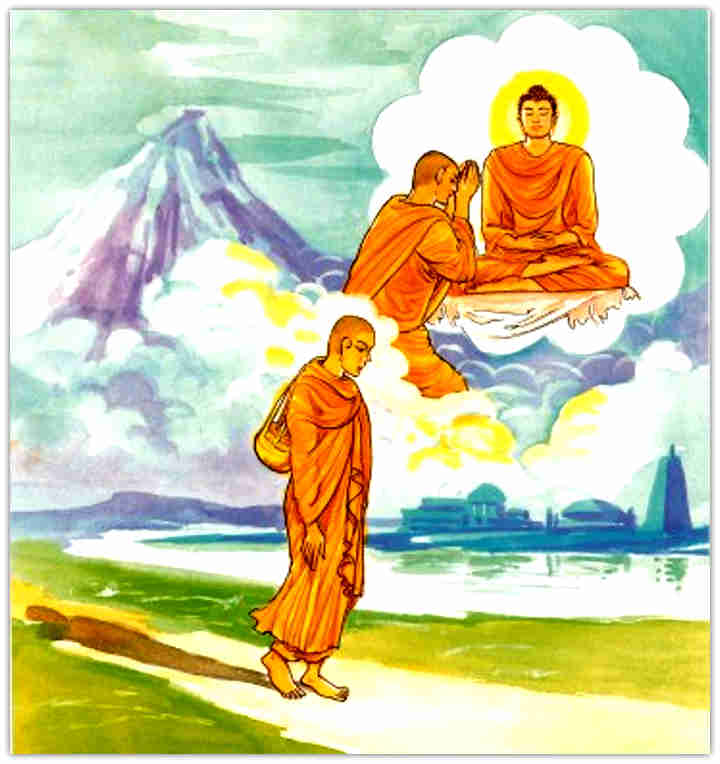Mind precedes all knowables,
mind’s their chief, mind-made are they.
If with a clear, and confident mind
one should speak and act
as one’s shadow ne’er departing.
Explanation: All that man experiences springs out of his thoughts. If his thoughts are good, the words and the deeds will also be good. The result of good thoughts , words and deeds will be happiness. This happiness will never leave the person whose thoughts are good. Happiness will always follow him like his shadow that never leaves him.
The Story of Mattakundali (Verse 2)
While residing at the Jetavana Monastery in Savatthi, the Buddha spoke this verse, with reference to Mattakundali, a young Brahmin.
Mattakundali was a young Brahmin, whose father, Adinnapubbaka, was very miserly and never gave anything in charity Even the gold ornaments for his only son were made by himself to save payment for workmanship. When his son fell ill, no physician was consulted, until it was too late. When he realized that his son was dying, he had the youth carried outside on to the verandah, so that people coming to his house would not see his possessions.
On that morning, the Buddha arising early from his deep meditation of compassion saw, in his Net of Knowledge, Mattakundali lying on the verandah. So when entering Savatthi for alms-food with his disciples, the Buddha stood near the door of the Brahmin Adinnapubbaka. The Buddha sent forth a ray of light to attract the attention of the youth, who was facing the interior of the house. The youth saw the Buddha; and as he was very weak he could only profess his faith mentally. But that was enough. When he passed away with his heart in devotion to the Buddha he was reborn in the Tavatimsa celestial world.
From his celestial abode the young Mattakundali, seeing his father mourning over him at the cemetery, appeared to the old man in the likeness of his old self. He told his father about his rebirth in the Tavatimsa world and also urged him to approach and invite the Buddha to a meal. At the house of Adinnapubbaka the question of whether one could or could not be reborn in a celestial world simply by mentally professing profound faith in the Buddha, without giving in charity or observing the moral precepts, was brought up. So the Buddha invited Mattakundali to appear in person; Mattakun-dali then appeared in his celestial ornaments and told them about his rebirth in the Tavatimsa realm. Only then, the listeners became convinced that the son of the Brahmin Adinnapubbaka, by simply devoting his mind to the Buddha, had attained much glory.
Commentary
How we experience our circumstances depends on the way we interpret them. If we interpret them in the wrong way, we experience suffering. If we interpret them in the right way we experience happiness. In other words, our happiness or unhappiness depends on the way we think.
Thought also creates circumstances in a futuristic sense. If we harbour ill will and speak or act with ill will, people will begin to hate us. We will be punished by society and the law. After death, we will also be reborn in a realm of suffering. Here, ‘thought’ refers to kamma (action) and ‘experience’ refers to vipaka (consequences).
The message finally conveyed by this pair of verses is: “Think wrong and suffer. Think right and be happy.” This pair of verses was spoken by the Buddha to show the inevitable consequence (vipaka) of good and evil thought (kamma). Man reaps what he has sown, both in the past and in the present. What he sows now, he reaps in the present and in the future. Man himself is responsible for his own happiness and misery. He creates his own hell and heaven. He is the architect of his own fate. What he makes he can unmake. Buddhism teaches the way to escape from suffering by understanding and using the law of cause and effect. Buddhism is very realistic and optimistic. Instead of blindly depending on unknown supernatural powers, hoping for happiness, Buddhism finds the true way to happiness realistically.

